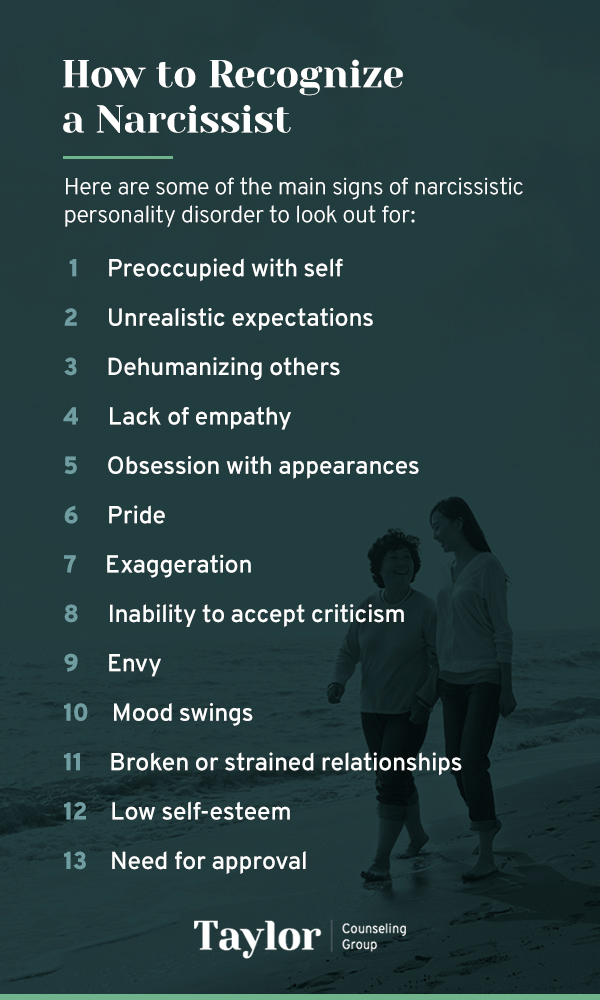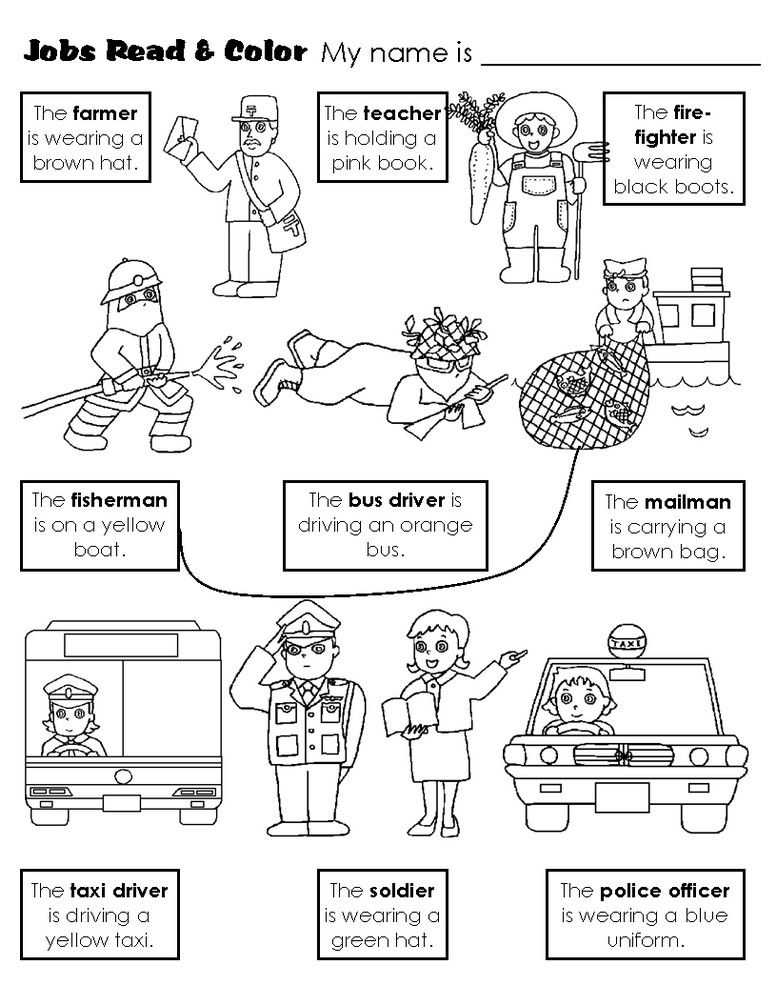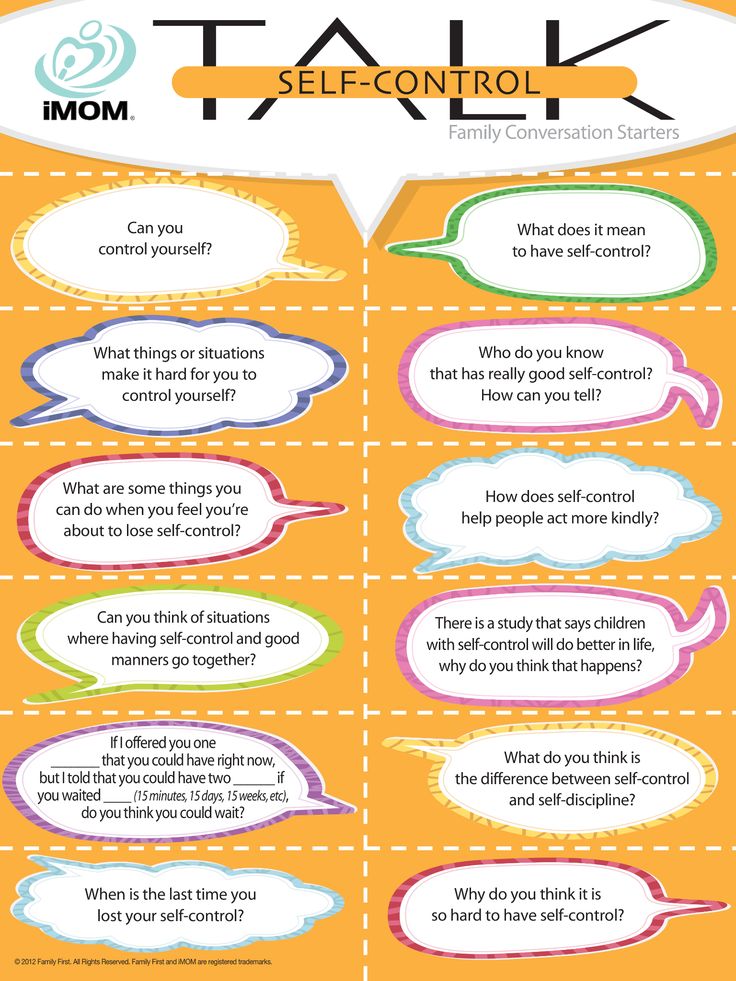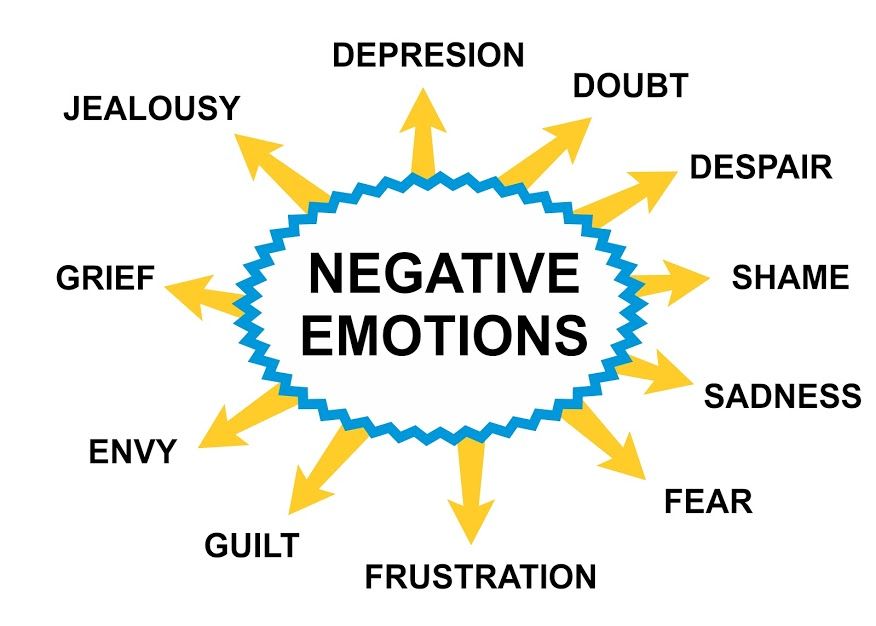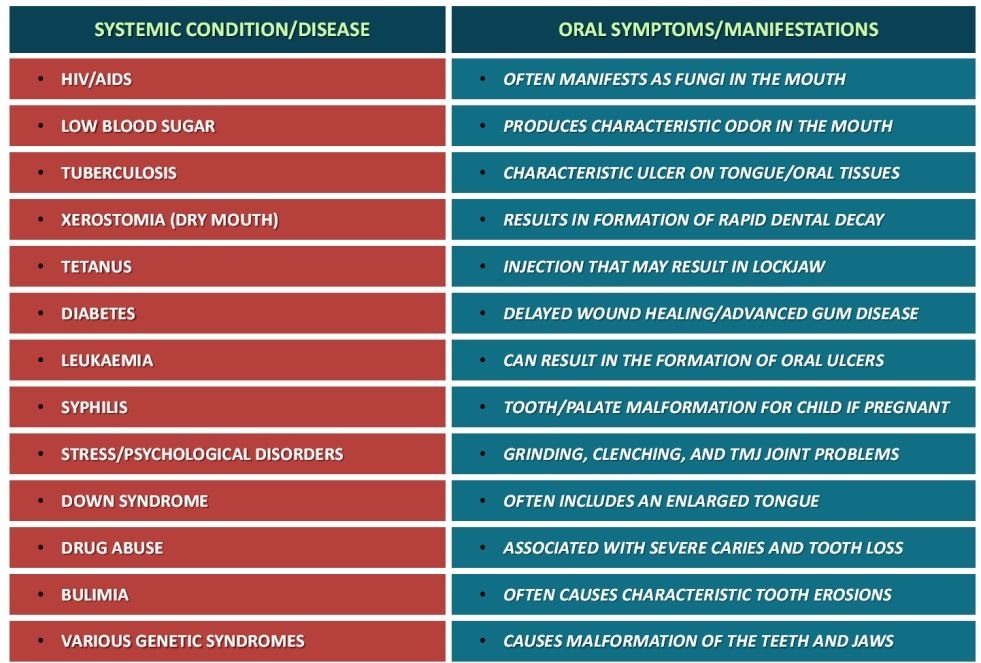How to get what you want from a narcissist
How To Win With A Narcissist: 5 Secrets Backed By Research
***
Before we commence with the festivities, I wanted to thank everyone for helping my first book become a Wall Street Journal bestseller. To check it out, click here.
***
Is that difficult someone driving you up the wall? What’s the best way to handle impossible people?
I’ve broken down the research on how to handle narcissists, borderlines, psychopaths and other “cluster B” troublemakers, and the primary answer is always the same:
Run. Get outta there. No contact.
Personality disorders are notoriously difficult to treat, cluster B’s are notoriously difficult to deal with, and you’re not a therapist. (Though at this point you probably feel like a very frazzled one.)
But I received a lot of responses from readers basically saying: What do I do if I can’t leave? Is there any way to make them change?
It’s their boss and they need this job. It’s their spouse and they have kids together. It’s their best friend and they can’t in good conscience abandon them.
So how do you deal with a narcissist when saying “MEEP-MEEP” and sprinting away Road-Runner-style isn’t an option?
Dr. Craig Malkin is a psychologist at Harvard Medical School and his new book Rethinking Narcissism: The Bad — and Surprising Good — About Feeling Special offers some hope.
A lot of what you know about narcissists is wrong and there are proven ways to not only deal with them but to help them get better. (Not that narcissists need to get better — hey, they’re “perfect”, right?)
Okay, let’s get to work…
Sympathy For The Devil
Turns out we all have some narcissistic traits and they’re normal, natural and, frankly, essential. Without them you’d deal with crippling low self-esteem, Eeyore.
It’s when people go too far down the spectrum into “malignant” narcissism that we get the entitlement, exploitation, and other assorted nastiness narcissists are so well known for.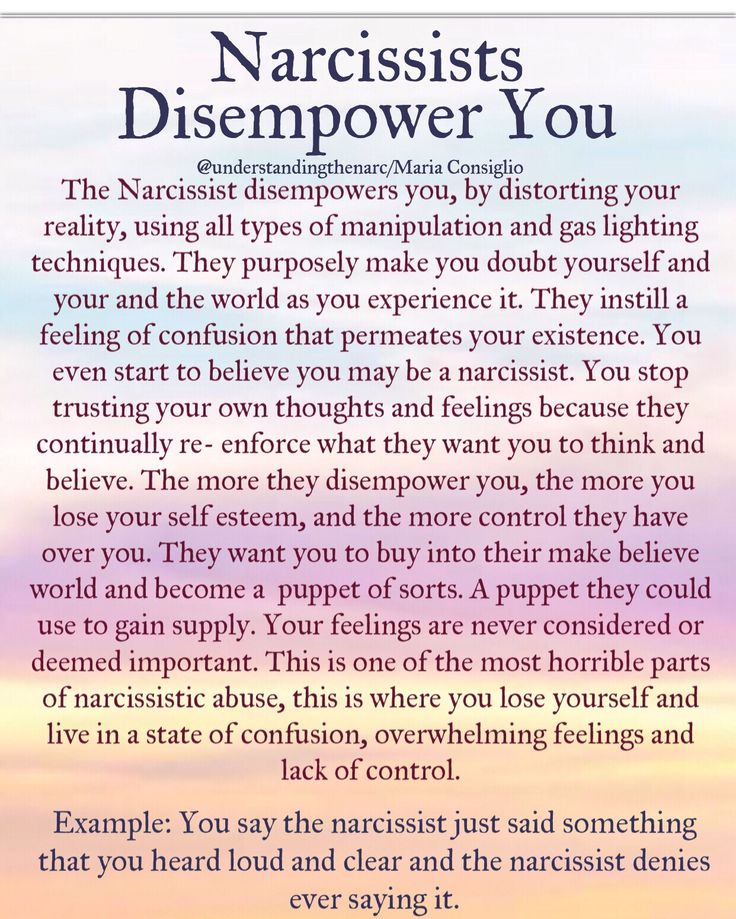
From Rethinking Narcissism: The Bad — and Surprising Good — About Feeling Special:
We need our grandiosity at times to feel happy and healthy. And a growing body of recent research concludes that a little narcissism, in adolescence, helps the young survive the Sturm und Drang of youth; moderate teenage narcissists are less anxious and depressed and have far better relationships than their low and high narcissism peers. Likewise, corporate leaders with moderate narcissism are rated by their employees as far more effective than those with too little or too much…. The difference between narcissists and the rest of us is one of degree, not kind.
Extreme narcissism is a disorder, and to help those who have it we need to remember it’s a disorder. When people suffer from depression, anxiety or borderline personality disorder we tend to feel sympathy but with narcissism we often moralize and say they’re “bad.” That’s like feeling sorry for people with tuberculosis but saying those with meningitis are a bunch of jerks who had it coming.
Malkin explains that narcissists weren’t given secure love when growing up. They weren’t appreciated for just being themselves; they were only celebrated for what they achieved. When you can’t count on empathy from those around you, you stop trusting, and you feel ashamed of your normal human frailties.
You stop trying to get your emotional needs met from love and instead try to be special — better than others. Better looking, more talented, smarter or more accomplished. You stop trying to soothe your insecurities by relying on people and instead turn to a fantasy self where you are superior.
(To learn more about the science of a successful life, check out my new book here.)
The childhood of a narcissist is sad and a little scary. But it also holds the secret to helping narcissists get better…
How Do You Fix Someone Who Is “Perfect”?
All psychopaths are narcissists, but not all narcissists are psychopaths. Psychopaths can’t feel empathy.
For narcissists, empathy is more like an underdeveloped muscle. Still there, but as you have probably experienced first hand, it sure doesn’t get used much. You need to help them build that empathy muscle.
Still there, but as you have probably experienced first hand, it sure doesn’t get used much. You need to help them build that empathy muscle.
Calling them a jerk or criticizing their behavior only makes them worse. But when they are compassionately reminded of the importance of their relationships — and how those relationships can help them achieve their goals — they can improve.
From Rethinking Narcissism: The Bad — and Surprising Good — About Feeling Special:
More than a dozen studies exploring whether or not narcissists can change have now been conducted… and they all point to the same conclusion: encouraging narcissists to feel more caring and compassionate reduces their narcissism… If narcissists are approached in a gentler way, many seem to soften emotionally. When they feel secure love, they become more loving and more committed in return… The lesson from research is that people only slide down the spectrum when they’re reminded of the importance of their relationships.
Change doesn’t come from telling them off for being too success-driven, ruthless, or manipulative; it comes by showing them the benefits of collaboration and understanding.
No, this isn’t a Disney film and giving the Grinch a big hug isn’t going to instantly turn him into a sweetheart. But psychologists have found success with using what are called “empathy prompts.”
From Rethinking Narcissism: The Bad — and Surprising Good — About Feeling Special:
Prompting involves two components: voicing the importance of your relationship and revealing your own feelings. Voicing the importance of your relationship generally involves making supportive statements, such as “You matter so much to me” or “You’re important to me” or “I care about you a great deal.” Declarations like these signal how special someone is to us. They’re the kind of reassurance many narcissists don’t even realize they miss. They nudge people toward thinking about the relationship, moving the focus from you and me to we.
More importantly, they signal your willingness to offer secure love.
So you might say:
- “I consider you an important friend. That’s why I feel so sad when you don’t return my calls for weeks.”
- “Mom, you’re one of the most important people in my life. So when you question my every move, I feel devastated, like I’m a failure in your eyes.”
One caveat: for people who have narcissistic tendencies, empathy prompts can, over time, help to reduce their bad habits. But if someone has full-blown Narcissistic Personality Disorder, well, the cancer has metastasized. They may be too far gone to improve without professional help.
That’s sad, but it gives empathy prompts a second use: they’re a good litmus test for whether there’s hope for the “narcy” in your life.
When empathy prompts are delivered properly and sincerely, without a raised voice or implied guilt trip, most people melt. If your narcy is impervious to them, they may be impervious to your help overall.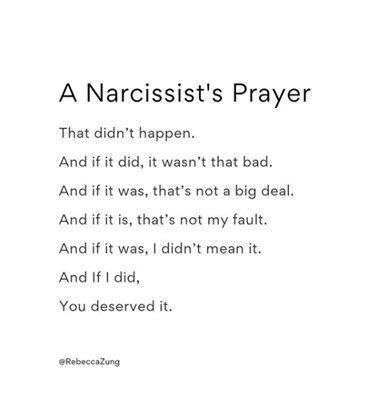
From Rethinking Narcissism: The Bad — and Surprising Good — About Feeling Special:
Can your partner, friend, or relative place the relationship— in other words, place you— ahead of their coercive attempts to feel special? Can they allow your pain to touch them and say they’re sorry or comfort you or just show they understand? If they can’t, you need to view their narcissism exactly as you would any addiction. The “drug” has taken over their lives…
So how do you know if empathy prompts are working? Malkin explains that you’re succeeding when your narcy responds by:
- Affirming: “You’re my best friend, too. I don’t want you to feel bad.”
- Clarifying: “How long have you been feeling sad around me?”
- Apologizing: “I’m sorry— I don’t want you to feel like a failure.”
- Validating: “I know my sarcasm hurts you.”
(To learn how to deal with psychopaths and other toxic people, click here.)
This is a great system for dealing with that self-absorbed loved one in your personal life. But you probably can’t get this deep and emotionally gooey at the office.
But you probably can’t get this deep and emotionally gooey at the office.
So how do you help a narcissistic boss or co-worker?
The Narcissist In The Corner Office
The knee-jerk advice everyone gives when dealing with a workplace monster is to report them. But as experts like Stanford professor Bob Sutton have made clear over and over, that just doesn’t work.
A 2008 survey of 400 people asked what their employers did when they reported being bullied. Malkin lists the results:
- 1.7% conducted a fair investigation and protected the target with punitive measures against the bully.
- 6.2% conducted a fair investigation with punitive measures for the bully but no protection for the target.
- 8.7% conducted an unfair investigation with no punitive measure for the bully.
- 31% conducted an inadequate/unfair investigation with no punitive measures for the bully, but plenty for the target.
- 12.8% did nothing or ignored the problem with no consequences for anyone, bully or target.
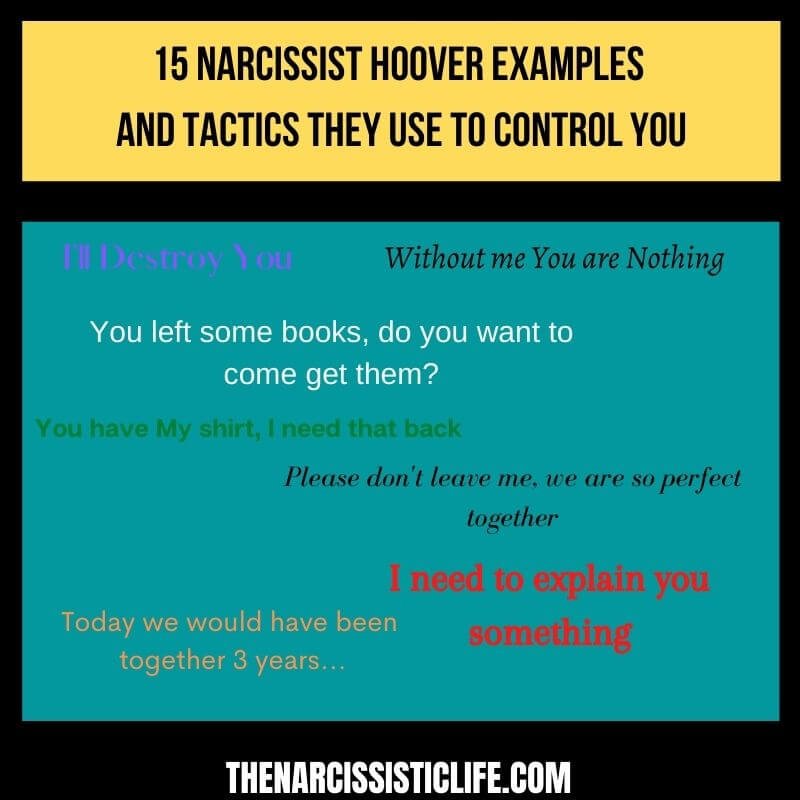
- 15.7% did nothing, but retaliated against the target for reporting. Target remained employed.
- 24% of employers did nothing, except fire the target.
Long story short: 70+% of the time it’ll be you who takes it on the chin. So reporting doesn’t work and empathy prompts might be a little too personal — at least at first.
So what should you do to deal with your office narcy? Malkin has some tips:
1) Use The Word “We”
Use the first person plural whenever possible. Emphasize relationships in all communication. Yeah, I know, it sounds ridiculous that this is going to get Mr. Center-Of-The-Universe to grow a heart…
But research shows it works.
From Rethinking Narcissism: The Bad — and Surprising Good — About Feeling Special:
…researchers had narcissists read a passage filled with words like we, our, and us and count the number of pronouns. This simple activity not only made them more willing to help people in need (by giving them the spare change in their pockets, for example), it also made them less obsessed with becoming famous!
So “we” should start doing this, shouldn’t “we”?
2) Reward Good Behavior
Compliment them when they are warm.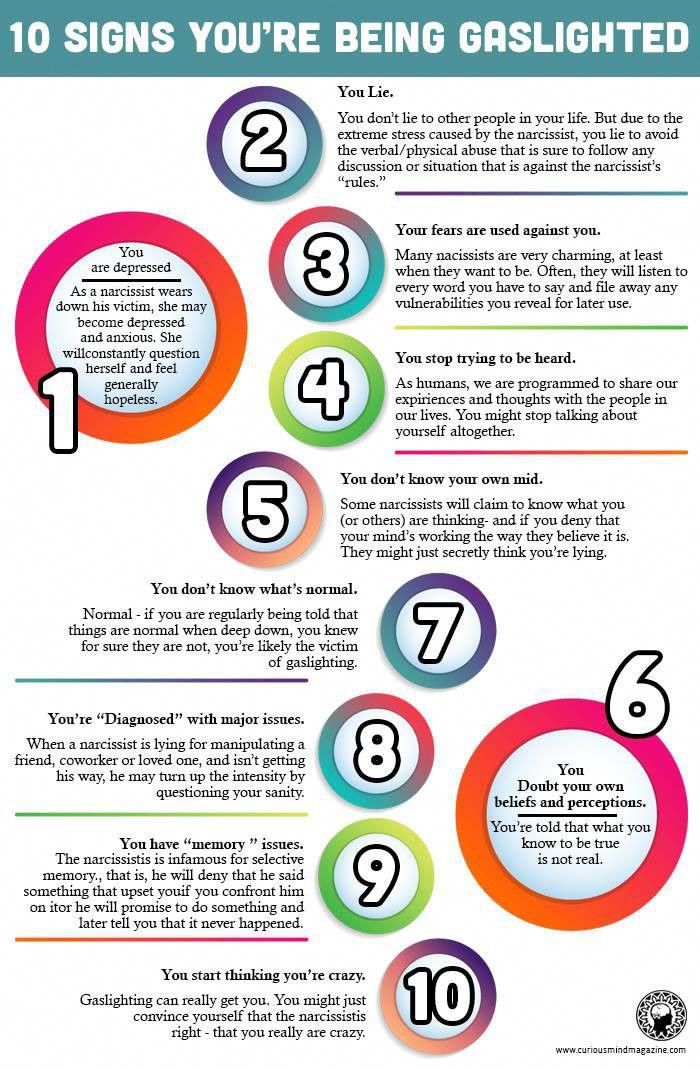 And compliment them for their warmth — not for achievement or performance.
And compliment them for their warmth — not for achievement or performance.
From Rethinking Narcissism: The Bad — and Surprising Good — About Feeling Special:
…look for moments when the person demonstrates better behavior and underscore them. Nudging narcissists to center means focusing on moments when they show some capacity for collaboration, interest in other people, or concern for the happiness of those around them— in short, whenever they behave more communally.
3) Contrast Good and Bad Behavior
Is the complimenting helping? Okay, then it’s safe to take it up a notch. Diplomatically contrast their bad behavior with their good behavior.
From Rethinking Narcissism: The Bad — and Surprising Good — About Feeling Special:
Contrasting is much the same as catching, except that you’re describing the past and the present at the same time. Noting bad behavior becomes far more effective when it’s paired with some recollection of more communal behavior (assuming you’ve caught any).

Malkin suggests something like:
I had such a great experience on our team last week when we left time for everyone to contribute. Today, we had less of a chance and I felt a lot less hopeful about the project. Can we try to do it the same way as last week?
Getting good results? Now you can finally move to something closer to empathy prompts.
4) Teach Them Their ABCs
Malkin says that first you should tell them how you’re feeling:
A is for affect, aka feeling. Feeling statements use the word I liberally, as in I’m feeling uncomfortable, uneasy, unhappy. You can also use stronger words like sad, afraid, scared, but since you’re usually not in a friendship or romantic relationship with the person you’re speaking to, vaguer, less intense emotional language might be better. Follow your gut on that one. The main goal is to describe your experience only. Never use “you” in this step.
Then tell them what behavior is causing it:
B is for behavior.
This is the experience, interaction, or action that causes the feelings. For example: When you raise your voice; When I hear only criticism; When you sound sarcastic; When you cut me off midsentence.
And then let them know what correction you would like to see:
C is for correction. This refers to the change you’re seeking. Proper assertiveness always involves a request of some kind. It’s a form of coaching. You’re telling the listener what they need to do to improve interactions. Examples: Can you lower your voice?; Can you tell me what steps you want taken?; Can you use a kinder tone?
For example:
“I feel unhappy the rest of the day when you criticize me in front of the entire group. Can you save your feedback for one-on-one meetings?”
(To learn the seven-step morning ritual that will make you happy all day, click here.)
Alright, we’ve learned a lot. Let’s round it up and learn how we can always feel special… and not turn into a narcissist.
Sum Up
This is how to win with a narcissist:
- In your personal life, use “empathy prompts”: Music doesn’t soothe the savage beast, but reminding them about relationships and your feelings can.
- Use “We”: It’s just one word but it’s effective with narcissists. (If you can’t manage to do this you’re not paying attention to me. You should pay attention to me. I’m really important.)
- Reward Good Behavior: When the puppy behaves, give it a treat.
- Contrast good and bad behavior: “Normally when Jim turns in a report late you kick him down a flight of stairs. I thought it was wonderful today when you chose to throw a stapler at him instead.”
- Teach them their ABC’s: Mention your affect, their bad behavior, and the correction you’d like to see. This is an advanced Jedi move. Build to this with your Sith Lord, young Padawan.
Narcissists come in many flavors (grandiose, covert, communal, etc. ) but they all share one thing in common: they need to feel special.
) but they all share one thing in common: they need to feel special.
And, frankly, feeling special is kinda nice. We all like to feel special. But what’s the path to the healthy way of feeling special vs the narcissistic kind?
Don’t put up a false front. You’re human and you screw up. That’s normal and natural. Trying to seem perfect often earns you only envy.
Instead, show others your true self. Warts and all. You’ll look stupid sometimes. But that is when the people who truly care about you will show empathy. And you’ll grow closer to them, showing empathy back.
Ruthlessly striving to seem special in the eyes of strangers alienates those who care about you and is the path to narcissism. If you open up and are vulnerable you can have the only kind of specialness that matters…
Being special to the ones you love.
Join over 320,000 readers. Get a free weekly update via email here.
Related posts:
New Neuroscience Reveals 4 Rituals That Will Make You Happy
New Harvard Research Reveals A Fun Way To Be More Successful
How To Get People To Like You: 7 Ways From An FBI Behavior Expert
What Works and What Doesn’t
Written by Kara Mayer Robinson
You may wonder if your partner, co-worker, or family member is a narcissist. While many people have what doctors call narcissistic traits, like self-importance and entitlement (thinking they’re owed something), people diagnosed with narcissistic personality disorder can be a bigger challenge.
While many people have what doctors call narcissistic traits, like self-importance and entitlement (thinking they’re owed something), people diagnosed with narcissistic personality disorder can be a bigger challenge.
“Living with a narcissist requires a different or more advanced emotional skill set,” says Kimberly Perlin, a licensed clinical social worker Towson, MD. She specializes in helping women in relationships with narcissists and also treats narcissists.
Having a narcissist in your life can be frustrating and emotionally challenging. Your relationship may revolve around them. You may feel judged and exhausted by their demands.
When she was a child, Carla Marie Manly, PhD, a clinical psychologist in Santa Rosa, CA, didn’t realize her older sibling was a narcissist. “Growing up with this highly controlling person was extremely challenging,” she says. “It was only in my adult years that I came to realize this sibling was a deeply troubled narcissist.”
How to Spot a Narcissist
Narcissists have a strong sense of grandiosity. That means they think they’re more important than others and often seek out admiration.
That means they think they’re more important than others and often seek out admiration.
One of Perlin’s clients is a perfect example. “A client I worked with for years terminated therapy with me when he saw my new website and was insulted that the website didn’t talk about him,” she says.
Narcissists often:
- Have a strong sense of grandiosity (they have high levels of self-esteem, self-importance, self-confidence, and often feel like they’re superior to others)
- Are arrogant
- Take advantage of others to get what they want
- Believe they’re unique or special
- Exaggerate achievements and talents
- Need constant admiration
- Feel envy toward others
- Believe others envy them
- Lack empathy
- Are obsessed with fantasies of brilliance, power, or success
- Have a sense of entitlement
Narcissists and Relationships
Manly learned a lot about narcissists from her older sibling and her experiences working with them. “I’ve learned that narcissists are the focus of their own lives. They often believe they’re perfect and blame others for issues that arise at work, home, or social situations.” she says.
“I’ve learned that narcissists are the focus of their own lives. They often believe they’re perfect and blame others for issues that arise at work, home, or social situations.” she says.
Narcissists may do whatever it takes to get what they want. They generally don’t feel compassion and can’t connect intimately with others, even the people who are closest to them.
At work, a narcissist may seek admiration, even if it hurts others. They may take credit for other people’s work, undermine co-workers, or change their behavior to get approval from higher-level people. They may seem friendly and hard-working, but there’s often more to it than meets the eye.
At home, a narcissist can impact the whole family. If you’re in an intimate relationship with a narcissist, they may be highly critical of you, distant, and dismissive. You could feel invisible, disrespected, and lonely. If you’re a child of a narcissist, you may have been neglected or abused.
Sometimes it’s best to cut ties with a narcissist, especially if they’re abusive.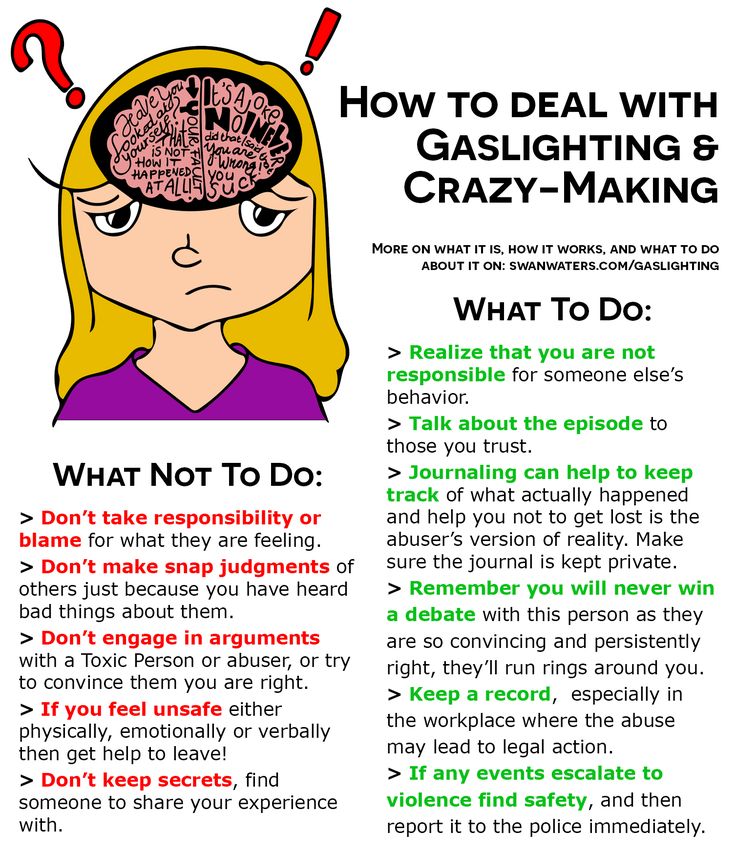
“For my own mental health, I’ve chosen to step back from investing in a personal relationship with my sibling,” Manly says. She accepts that her sibling doesn’t see their behavior as a problem and since her sibling has no desire for self-growth, an ongoing relationship will only lead to more frustration.
If you’re in a relationship with a narcissist, expect it to be challenging. “Buckle up, it will be a very bumpy ride,” says Forrest Talley, PhD, a clinical psychologist in Folsom, CA. “It will be an extraordinarily taxing relationship.”
What to Do With a Narcissist
Take these steps to handle a narcissist:
Educateyourself. Find out more about the disorder. It can help you understand the narcissist’s strengths and weaknesses and learn how to handle them better. Knowing who they are may also allow you to accept the situation for what it is and have realistic expectations.
Create boundaries. Be clear about your boundaries.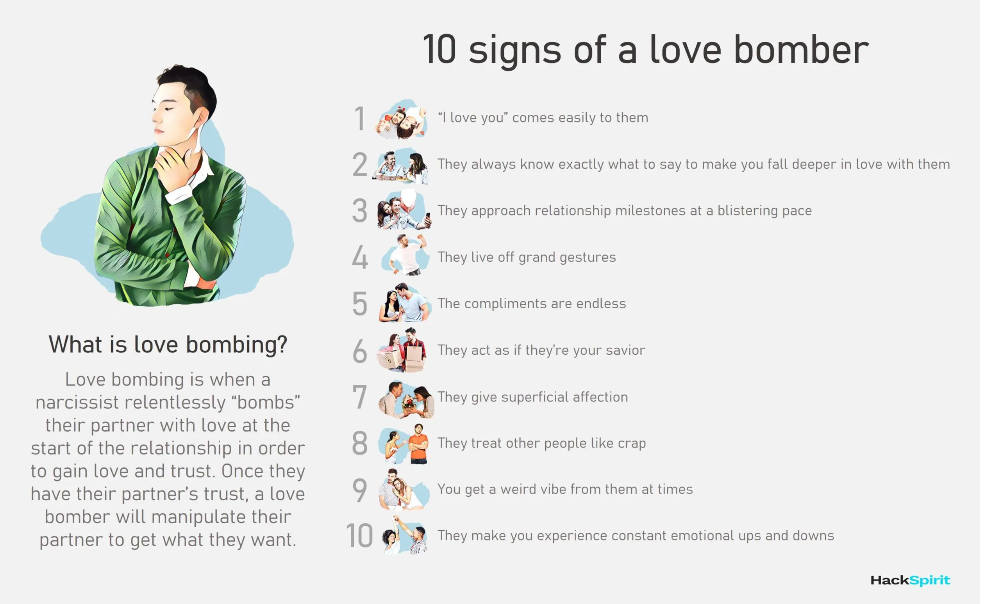 It may upset or disappoint the narcissist, but that’s OK. Remember, it’s not your job to control that person’s emotions, Perlin says.
It may upset or disappoint the narcissist, but that’s OK. Remember, it’s not your job to control that person’s emotions, Perlin says.
Speak up for yourself. When you need something, be clear and concise. “Make sure they understand your request, Perlin says.
Watch your wording. Narcissists don’t take constructive criticism well, Manly says. Try to make comments in careful, positive ways.
Stay calm. Try not to react if they try to pick a fight or gaslight you (making you doubt your own reality). If they lash out, think of them as a 3-year-old who feels rejected because their parent sets a bedtime, Talley says.
Create a support system. Living with a narcissist can lead to feelings of insecurity, confusion, and self-doubt. “Make sure you have a core group of people in your life that can support you,” Talley says.
Bring in a counselor. Therapy won’t cure your partner’s narcissism, but it may help you work certain things out.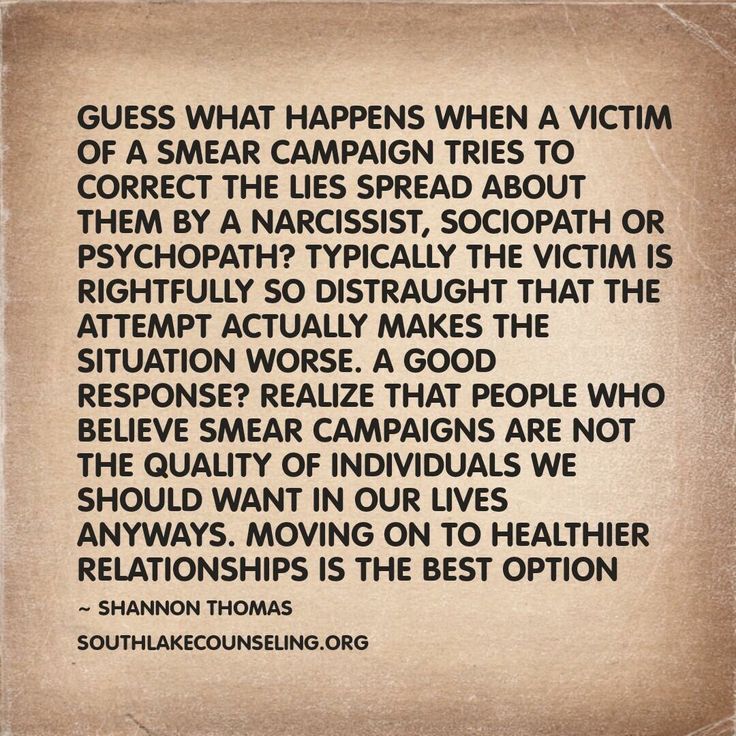 A counselor can show you ways to approach problem-solving with the narcissist.
A counselor can show you ways to approach problem-solving with the narcissist.
What Not to Do With a Narcissist
Certain things may trigger problems with a narcissist, so it’s best to avoid them.
Don’t argue or confront. Manly finds it’s best not to confront a narcissist directly. As difficult as it may be to constantly tiptoe around them, it can be better to manage their need to feel in charge.
Don’t try to direct them. Narcissists like to have control and often fear losing it. “Efforts to lead or instruct a narcissist will often fail,” Manly says.
Don’t expect them to see your point of view. Narcissists don’t like to admit when they’re wrong or that they’re unlovable, so trying to make them see things your way could backfire.
Don’t expect deep, meaningful communication. “Narcissists have very little empathy, so honest, heartfelt communication often doesn’t get through and can even create an angry outburst or shutdown response,” Manly says.
Don’t go over past issues. Don’t try to make them see a long line of behavior dating back years -- or how they’re just like their father, for example, Perlin says. Instead, stay in the present when you express requests or hurt feelings.
People with narcissistic personality disorder usually don’t change, so keep that in mind. Even if you learn to manage your relationship better, it probably won’t ever be a healthy relationship.
"I'm just going to hurt you a lot" Narcissism affects millions of people around the world. How to behave with them?: Society: Russia: Lenta.ru
We all know who Narcissus is: a young man from Greek myth who could not love anyone but himself, and died, unable to tear himself away from his reflection in a pond. Today, many people who seem narcissistic to us are also called narcissists. However, is it really so simple? Who are narcissists and how to behave with them correctly - in the material "Lenta.ru". nine0003
What is narcissism?
We are accustomed to consider as narcissists all those who, as it seems to us, are behaving too provocatively, constantly pointing out their successes and manipulating others.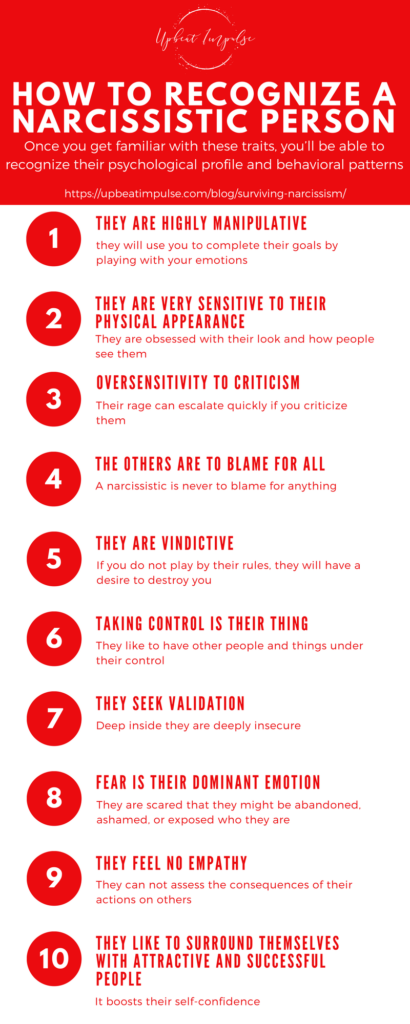 Such people are feared, considered incapable of empathy and even prone to aggression.
Such people are feared, considered incapable of empathy and even prone to aggression.
Indeed, narcissism in psychology means an exaggerated opinion about one's contribution to society or a group, excessive narcissism and conceit, self-centeredness, belief in one's exclusivity. At the same time, narcissism is a whole range of different personality traits, and some of them are useful to some extent, so you should not demonize this concept. nine0003
Clinical psychologist Anna Krymskaya in a Forbes conversation notes that there are four parts of the spectrum of narcissism: individual traits, character, accentuation and personality disorder. Among the healthy manifestations of narcissism, she named character and accentuation, and attributed personality disorder to a psychiatric diagnosis.
Photo: Abstral Official / Unsplash
For example, if a person has a narcissistic nature, he can be ambitious and achieve career success. And narcissistic accentuation is already an extreme degree of the norm.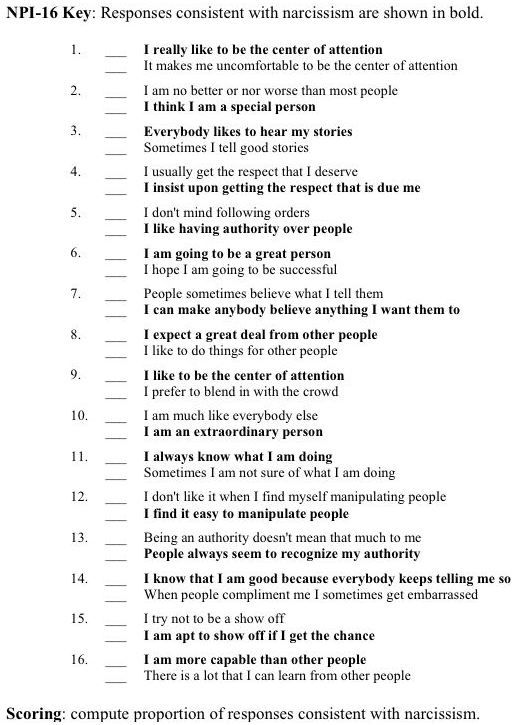 That is, the qualities of a narcissist are very pronounced and can interfere with a person in life, influence his relationship with others, but not so seriously as to diagnose a personality disorder. nine0003
That is, the qualities of a narcissist are very pronounced and can interfere with a person in life, influence his relationship with others, but not so seriously as to diagnose a personality disorder. nine0003
Narcissistic personality disorder is diagnosed when narcissism prevails over other personality traits, is uncontrollable, and creates serious problems in a person's relationships with other people. However, such a diagnosis requires a long-term pattern of behavior that exhibits at least five characteristics: an inflated sense of self-importance and talents, fantasies of unlimited power, beauty, ideal love, lack of empathy, desire to constantly receive admiration, belief in one's uniqueness, arrogance and arrogance , the conviction that others are jealous. nine0003
What are the characteristics of narcissists?
As clinical psychologist Christina Andreyuk explains, in “normal” narcissism, people try to please others, which helps them achieve success in their careers or adapt to society. However, in the case of pathology, the narcissist has distorted ideas about himself, which is reflected in his relationships with people: the constant search for recognition leads to manipulation and conflict.
However, in the case of pathology, the narcissist has distorted ideas about himself, which is reflected in his relationships with people: the constant search for recognition leads to manipulation and conflict.
Usually a pathological narcissist:
1. exaggerates his achievements and talents; expects admiration, even if he has not done anything significant, but simply cooked dinner; nine0003
2. fantasizes about how he will come to success, power, considers himself a genius in his work and is sure that if he has not yet achieved what he wanted, then everything is still ahead;
3. I am sure that there are very few people like him, that he is not like others, and the environment should be appropriate: high social status and attractive appearance;
4. considers that everyone owes him, and expects that his requests will be fulfilled at the first call; I am sure that he is the best, and the shortcomings of others are a good reason for self-affirmation; nine0003
5.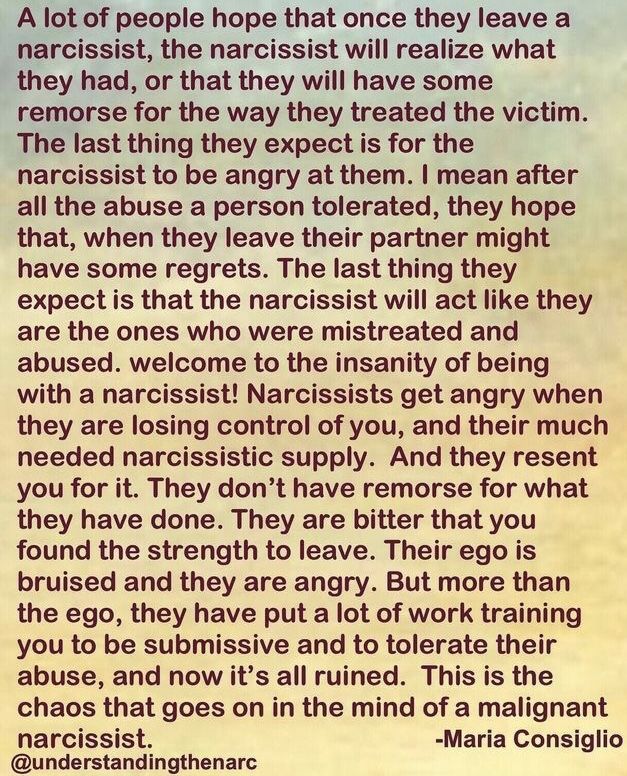 uses other people to achieve his goals and does not know how to thank sincerely - he does it only because it is customary;
uses other people to achieve his goals and does not know how to thank sincerely - he does it only because it is customary;
6. does not feel empathy and does not think when hurting someone;
7. envious of others and believes that others envy him - usually the narcissist explains the criticism in his address with envy;
8. behaves defiantly because he is confident in his uniqueness and ability to influence others;
9. believes that he does not need other people to achieve results and make decisions, he is always confident in the correctness of his actions. nine0003
Photo: Daniel Monteiro / Unsplash
At the same time, contrary to popular belief, narcissists very often do not like themselves - they suffer from loneliness, dissatisfaction, inner emptiness. With their behavior, they try to cover up low self-esteem, and the slightest criticism or failure can lead to narcissistic injury. At the same time, narcissists can rush from one extreme to another: either they feel better than everyone else, or, on the contrary, they believe that there is no one worse than them.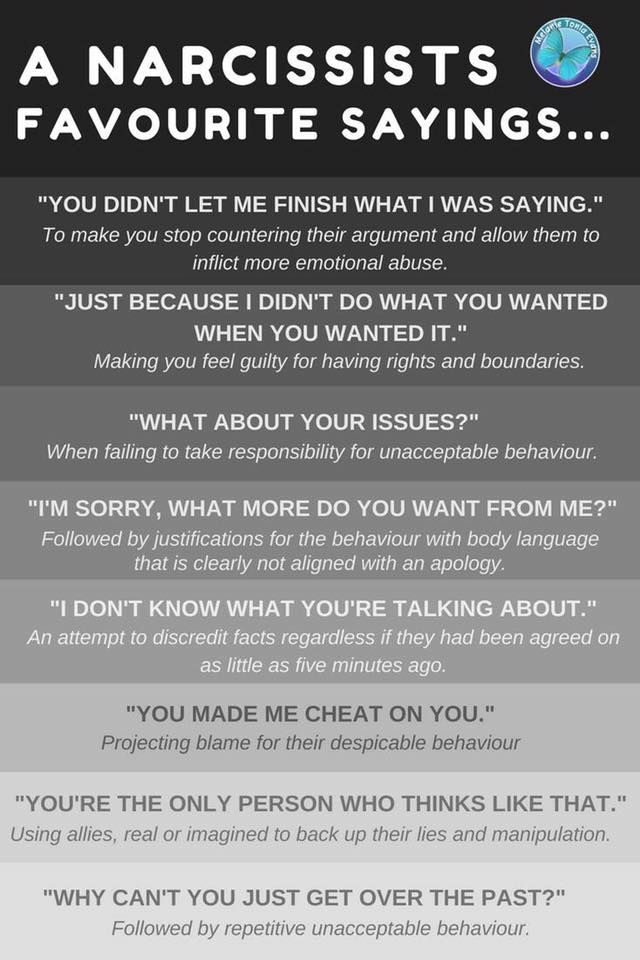
What are daffodils like? nine0005
According to psychologists, people become narcissists who did not receive enough admiration and praise from their parents in childhood, felt a sense of inferiority due to their words and actions, and therefore did not develop self-confidence.
Psychologists distinguish three types of narcissism:
1. "grandiose" type narcissism;
2. vulnerable (hidden) narcissism;
3. perverse narcissism.
The first type includes people with inflated conceit, impudent, charismatic. They exalt themselves in the eyes of others, quite obviously use leverage: they can humiliate and criticize others, be rude and sarcastic. They must be the best in everything and are ready to embellish reality to create the perfect picture for others, but often they feel dissatisfaction and emptiness inside. nine0003
People of the second type are also self-centered and want attention, but they are more difficult to recognize: they are more reserved and introverted.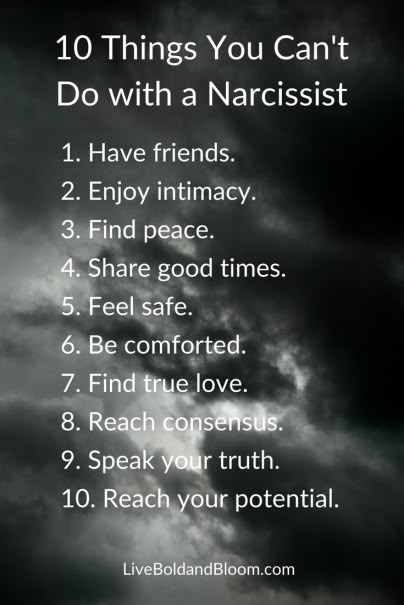 At the same time, unlike extroverted "grand" narcissists, covert narcissists do not show self-esteem so obviously, they deliberately downplay their achievements and talents in order to convince them, and by their behavior will achieve that people praise them without attracting get a lot of attention.
At the same time, unlike extroverted "grand" narcissists, covert narcissists do not show self-esteem so obviously, they deliberately downplay their achievements and talents in order to convince them, and by their behavior will achieve that people praise them without attracting get a lot of attention.
Photo: Toa Heftiba / Unsplash
A covert narcissist may be emotionally abused or pretend to be a victim in order to gain support. He is not afraid to neglect other people's time and interests, he will pretend to be emotionally available, but only in order to make the other feel ashamed or guilty.
The behavior of narcissists of the third type is accompanied by traits of sociopathy (indifference, aggressiveness, disregard for the norms of society) - they have little admiration for their person, they want to dominate. Such people are not able to experience, they are prone to manipulation, emotional abuse and crime, sometimes enjoying it. nine0003
Sometimes types of daffodils are mixed.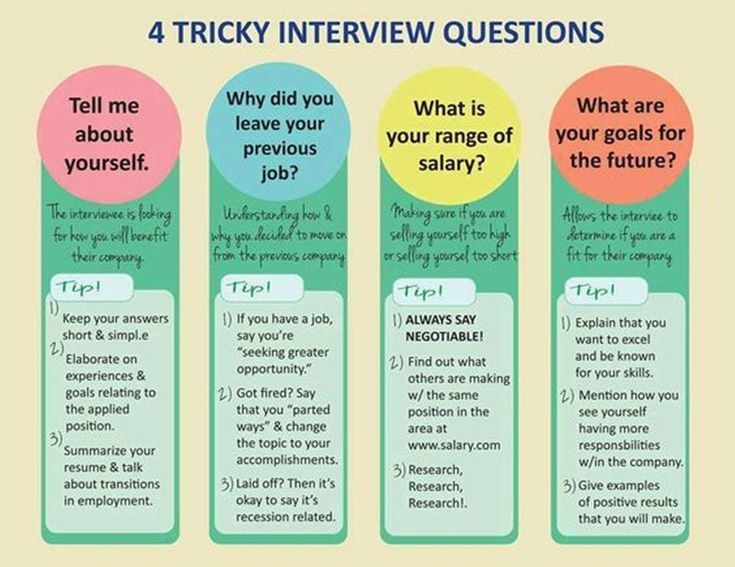
Narcissists in movies
Even if you haven't met or recognized a narcissist in real life, you've definitely seen him in a movie or TV series. For example, the behavior of a narcissist is demonstrated in the series Big Little Lies and Play Back. It is important for the husbands of the main characters that others think well of them, while in relationships with loved ones they show their real face, and in both cases it is far from ideal.
Another typical example is the Joker from the Batman universe, the films Suicide Squad and Birds of Prey. This hero constantly wants attention and recognition from the public, and in the animated series "Harley Quinn" about the breakup of the superheroine with the Joker, the emphasis is on how people of a narcissistic personality type poison the lives of loved ones. nine0003
- Are you going to kill me?
- Oh, I won't kill you. I'm just going to hurt you really, really bad
The Joker and Harley Quinn Suicide Squad
Shot: The Suicide Squad movie
An example of a narcissistic boss can be seen in the movie The Devil Wears Prada - this is exactly the kind of behavior Miranda Priestly demonstrates , which reacts very negatively to delays in the execution of its instructions and behaves quite narcissistically.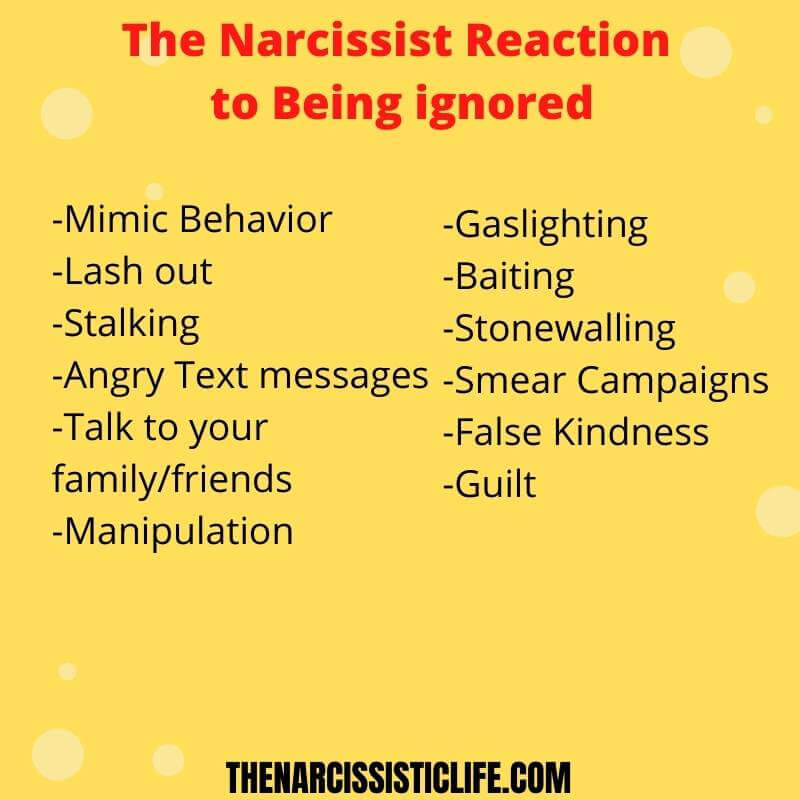 And, of course, you can’t help but remember Zlatopust Lokons from the movie “Harry Potter and the Chamber of Secrets” - he placed his portraits everywhere, and in the defense against the dark arts test, he even asked students questions about his favorite color and the most grandiose achievement. In one episode, to show off his magical abilities, he decided to fix Harry's broken arm during a Quidditch match, but accidentally robbed him of his bones with the wrong spell, and then was willing to rob the memory of two students for his own benefit. nine0003
And, of course, you can’t help but remember Zlatopust Lokons from the movie “Harry Potter and the Chamber of Secrets” - he placed his portraits everywhere, and in the defense against the dark arts test, he even asked students questions about his favorite color and the most grandiose achievement. In one episode, to show off his magical abilities, he decided to fix Harry's broken arm during a Quidditch match, but accidentally robbed him of his bones with the wrong spell, and then was willing to rob the memory of two students for his own benefit. nine0003
Narcissism in men and women
Some researchers believe that narcissism manifests itself differently in men and women. In 2015, scientists from the University of Buffalo (USA) found that men are more prone to narcissism than women. Experts have come to the conclusion that men more often than women feel their superiority, the right to privilege and exploitation of others. The average level of inclination to leadership and authoritarianism among men also turned out to be higher, but both sexes were considered equally prone to narcissism.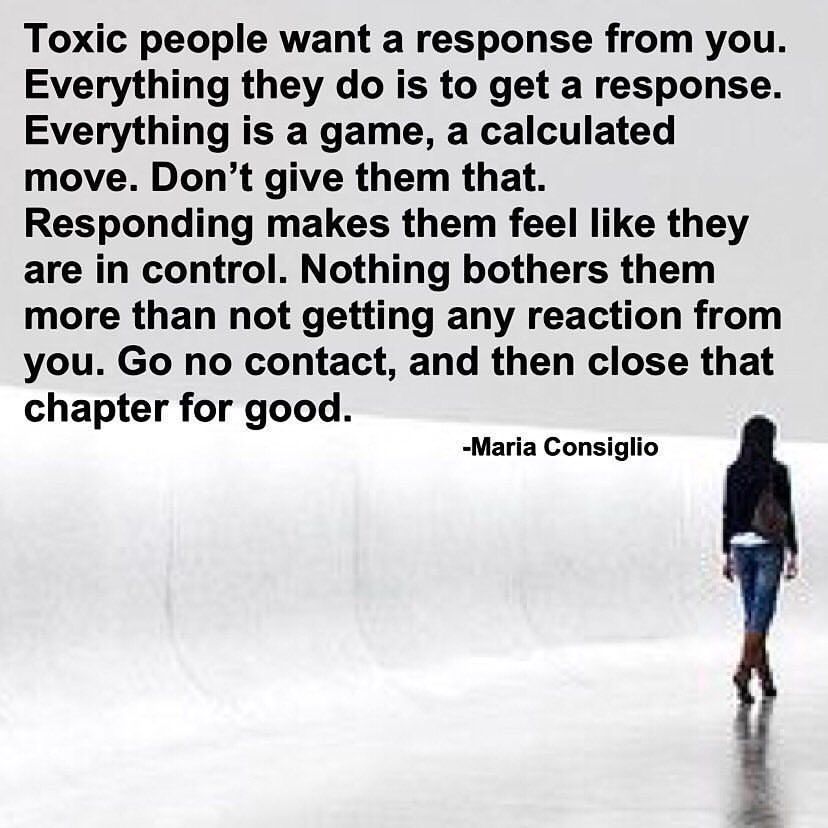 nine0003
nine0003
Scientists pointed out that gender roles in society are distributed from childhood, and society reacts negatively to human behavior that does not correspond to them: for example, aggressiveness and authoritarianism in women cause criticism, therefore women more often suppress such traits in themselves
How narcissists manipulate ?
Do not think that everyone we easily classify as narcissists are manipulators, because we have already found out that many people have narcissistic character traits, but not all of them affect relationships with others. nine0003
Photo: Nigel Tadyanehondo / Unsplash
However, there are tricks that narcissists most often use to manipulate. They were identified by family therapist Dan Newhart.
1. Narcissist appeals to your emotions, mostly negative - fear and guilt.
2. He refers to what the majority agrees with him: this is how he tries to let you know that otherwise you will be an outcast.
3.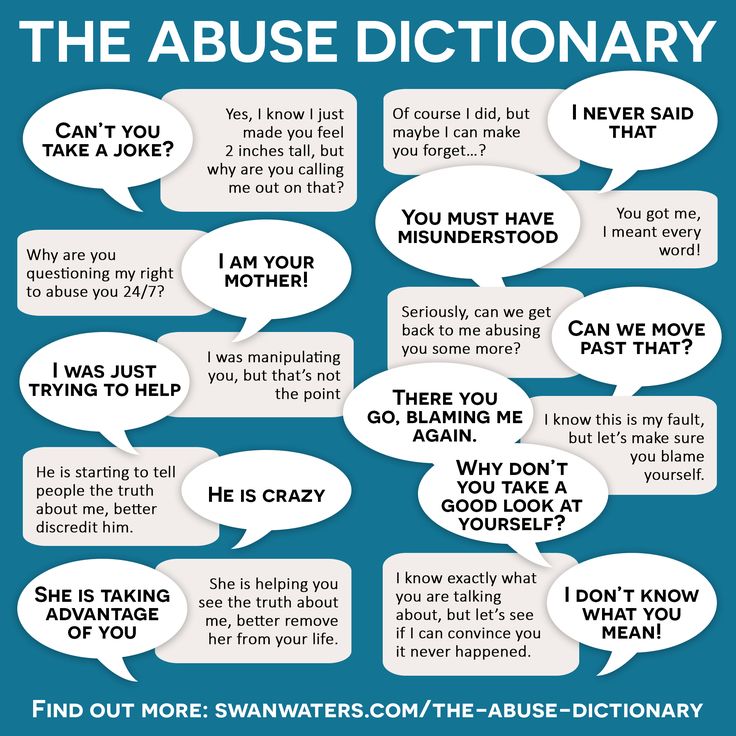 For him there is only "yes" and "no", "black" and "white" - there are only two options and no halftones. nine0003
For him there is only "yes" and "no", "black" and "white" - there are only two options and no halftones. nine0003
4. Compromises are possible, but only if they are beneficial to the narcissist.
5. The narcissist does not need to prove his point of view - this is the task of those who argue with him.
6. He will gladly flatter you to get what you want.
7. If you make a complaint to him, he will most likely brush it off, because you are talking some kind of absurd and unsubstantiated nonsense and this is not even worth discussing.
8. A narcissist will easily put a negative label on you if you are unpleasant to him or if he does not agree with you. He can also act in relation to a whole group of people in order to justify some kind of violence or negativity towards them. nine0003
9. He will make you a thousand promises and will not keep them.
10. The narcissist will easily take your own words out of context in order to turn them against you later.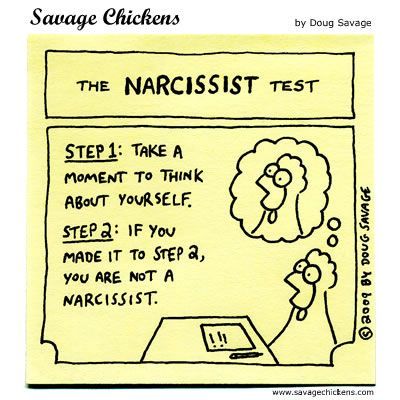
11. It doesn't cost him anything to make fun of you in order to belittle and show that you are not taken seriously.
12. Inflates the problem to an immense extent, arguing that some actions will eventually turn into disastrous consequences, and refuses to perform them, and also distracts from the essence if claims were made against him. nine0003
At the beginning of a relationship, narcissists try to make their partner feel important, as if he is the love of his life. However, this is followed by a sharp depreciation, and the partner is made to understand that he does not deserve special attention and should appreciate that he started a relationship with him at all. It turns into a swing, and a person next to a narcissist feels either the best or the worst.
How to deal with daffodils?
We have already found out that narcissism can be a character trait and does not always negatively affect others, therefore, first of all, it is important for you to understand how you feel next to a person and how it affects your condition.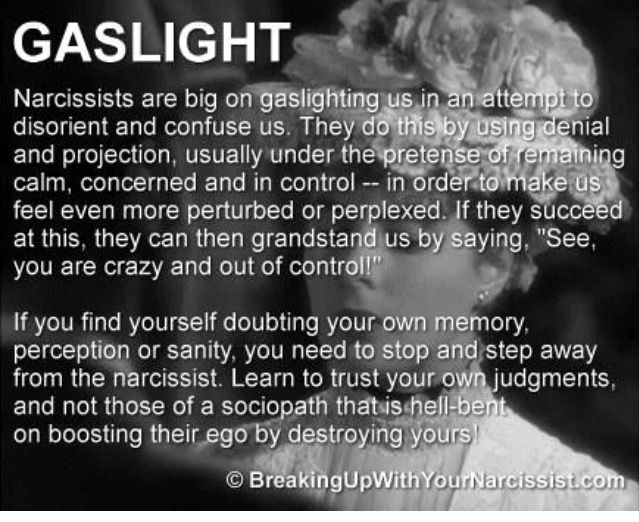 nine0003
nine0003
Ask yourself questions:
1. Is there any disrespect, aggression, manipulation in the relationship?
2. How is your self-esteem?
3. How do you feel after talking to a person?
4. Why are you talking to this person out of love, fear, pity, or a desire to help?
Photo: Mariya Georgieva / Unsplash
If, after answering these questions, you understand that you feel bad and uncomfortable, such a relationship should be stopped or at least minimize communication. However, even if you saw narcissistic traits in a person, relationships with him can be trusting and warm. nine0003
If it is impossible to end the relationship, you should follow the following rules:
1. do not tell the narcissist that he is a narcissist - this will cause anger and a desire to punish you, and then return power over you;
2. it is useless to wait for sudden improvements in behavior, so one should emotionally withdraw and try to ignore manipulations;
3.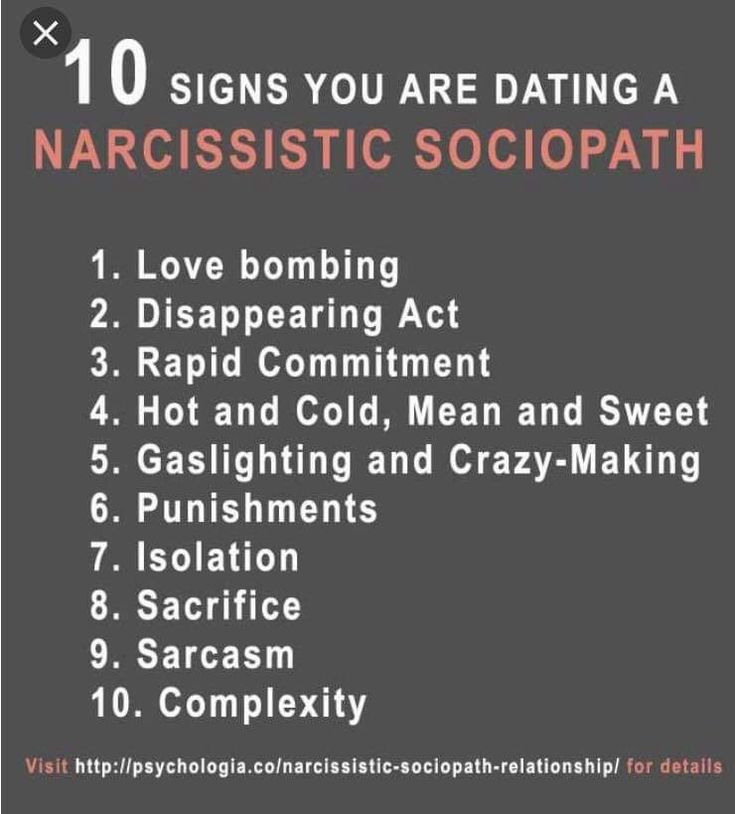 try to control your communication with the narcissist - strive to reduce contact with him, if you can not completely stop it; nine0003
try to control your communication with the narcissist - strive to reduce contact with him, if you can not completely stop it; nine0003
4. if you recognize the manipulation - answer in monosyllables "yes" and "no" so that the narcissist does not find something to cling to and continue the attack;
5. try to keep the discussion in one direction, directly indicating that you have moved away from the topic of conversation;
6. share less personal - these can all be used against you, either to make you feel bad or to make others see you as a bad, unstable or dangerous person;
7. manipulate back - praise the narcissist if you need to get something out of him, and he will most likely do what you need. nine0003
If you find yourself struggling with setting personal boundaries, we recommend that you see a psychotherapist.
What if I look like a narcissist?
If you think that you have narcissistic traits, you should observe yourself: how much time you talk and how much you listen, how much you give in relationships, and how much you take.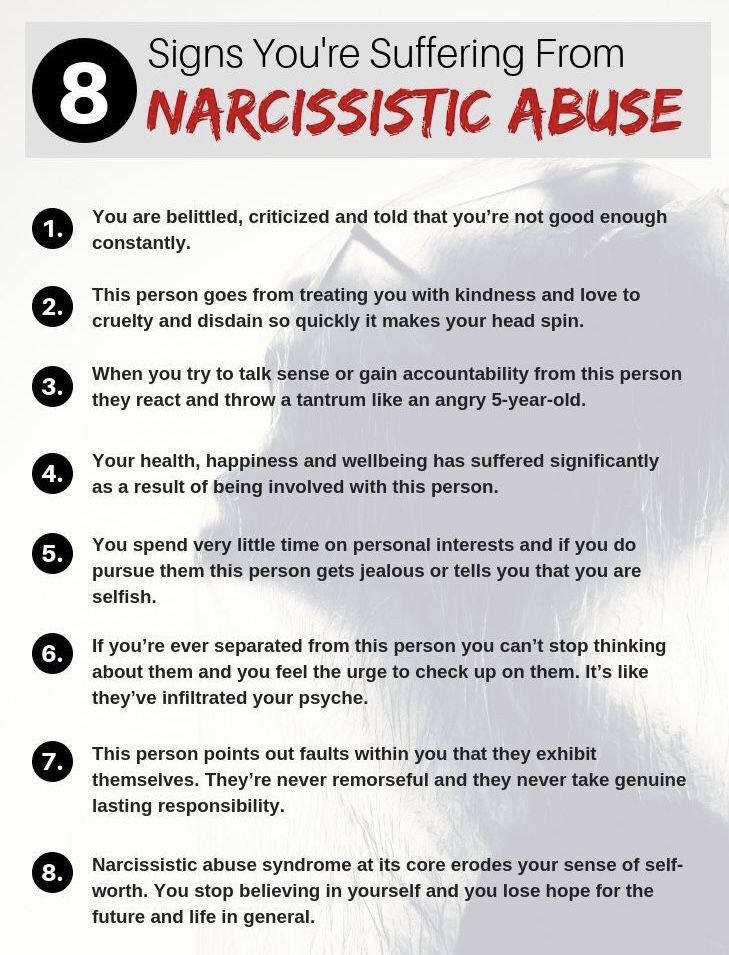 To assess your level of narcissism, you can refer to the Narcissistic Personality Inventory.
To assess your level of narcissism, you can refer to the Narcissistic Personality Inventory.
The situations you face should be viewed from three points of view: from your own point of view, from the point of view of the other person involved, and from the point of view of an outside observer. See if you have an attitude that you are unique and exceptional. If you notice this for yourself, you will have to learn to adequately evaluate yourself
However, even if you yourself notice your narcissism, it is almost impossible to cope with it alone due to the distortion of ideas about the world and ethics, lack of self-support and resistance of the psyche. As psychologist Anastasia Dolganova explained, psychotherapy can help in some cases, but with a serious severity of narcissistic personality disorder, it is also powerless.
Who are narcissists and how to communicate with them
Over the past few years, the topic of abusive relationships has become one of the most popular in the media space.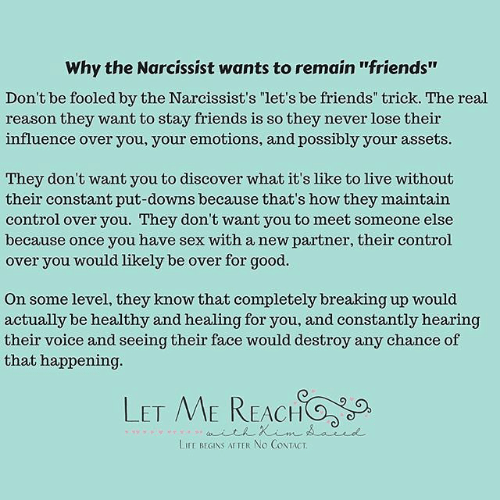 More and more often we hear about who narcissists are, how to build relationships with them (spoiler: it’s better not to do this), how to run away from them and not come back. We also decided to sort out the issue together with an expert - psychotherapist Alena Golzitskaya. nine0003
More and more often we hear about who narcissists are, how to build relationships with them (spoiler: it’s better not to do this), how to run away from them and not come back. We also decided to sort out the issue together with an expert - psychotherapist Alena Golzitskaya. nine0003
Polina Melnikova
Tags:
health
a question to a psychologist
Is the narcissist a severely injured person or a monster in human form?
Each of us has a touch of healthy narcissism, as it is important to love, value ourselves and take care of ourselves. In general, narcissists are different. The most common types:
- grandiose daffodil - likes to create and maintain the illusion of his own greatness;
- fragile narcissist - experiencing a whole bunch of difficult feelings on the topic of self-esteem and significance, while he may not show toxic patterns when interacting with others;
- the malignant narcissist is the most socially dangerous, inclined to abuse power, manipulate people for his own interests, being absolutely indifferent to their suffering.

What is the difference between NPD, narcissistic personality accentuation and narcissistic trauma? nine0183
As with any characterological feature, in the case of narcissism we can mentally distribute all people on a conditional scale, from the minimum severity of the trait to the maximum. Narcissistic personality disorder is the most pronounced manifestation of narcissism and all the characteristics of a person associated with it. Narcissistic accentuation is a less pronounced manifestation of such properties.
Narcissistic trauma, in the broadest sense, is the experience the narcissist experiences when confronted with a reality in which his self-esteem has been hurt because his worth has been questioned. nine0003
How and under what conditions is a narcissistic personality formed?
With a combination of genetic and social factors. The environment affects how genes will manifest themselves.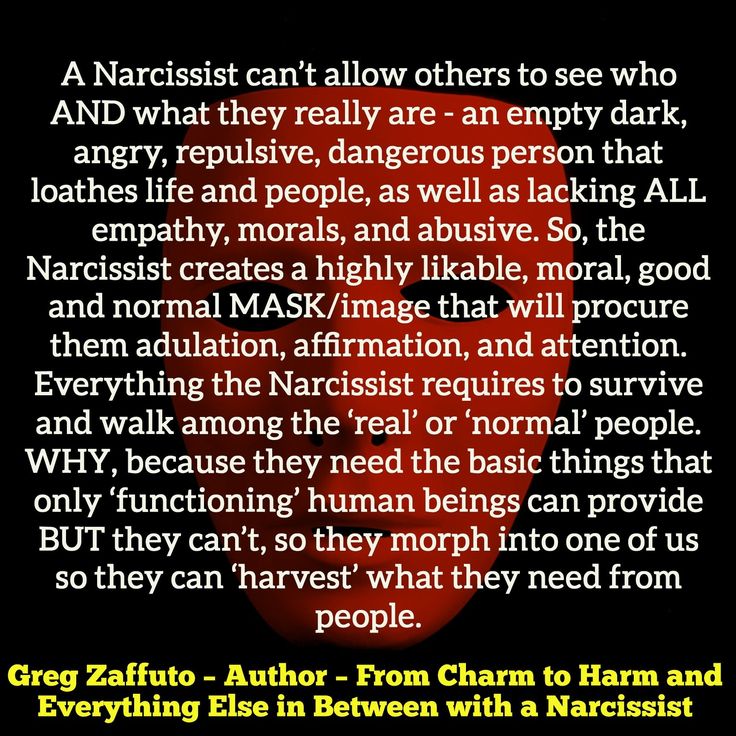 Of course, upbringing plays a huge role: if a child is brought up with an emphasis on external attributes of power and influence, if he is taught from childhood that he is “unique” and “exceptional”, while devaluing others, if parents themselves demonstrate manipulative techniques in dealing with other people, the child is more likely to grow up narcissistically organized. nine0003
Of course, upbringing plays a huge role: if a child is brought up with an emphasis on external attributes of power and influence, if he is taught from childhood that he is “unique” and “exceptional”, while devaluing others, if parents themselves demonstrate manipulative techniques in dealing with other people, the child is more likely to grow up narcissistically organized. nine0003
How does the narcissist perceive the world and others? What is the difference between the worldview of such a person and a healthy one?
In general, the narcissist tends to overestimate his own importance and influence in comparison with other people - as a result, he is completely focused on himself, seeks to attract attention in every possible way in order to reinforce his own beliefs.
But at the same time, inside he is constantly afraid that he will not be appreciated enough, and as soon as this happens, he experiences a strong sense of shame and can become aggressive and vengeful. nine0003
nine0003
Is it true that narcissists don't have empathy?
No, I wouldn't say that. They are prone to empathy, they just do not use it much - if only to enter into trust and attract attention. But as soon as a person falls into their sphere of influence, they change their strategy, becoming demanding, capricious manipulators.
Can a narcissist know how to love and make friends? When a narcissist says "I love you" is it manipulation or the truth?
A narcissist, like everyone else - perhaps even more so - needs friends. Only their perception of friendship and love is extremely different from the universal one. They strive to receive attention and love, but are practically unable to give it disinterestedly. If the narcissist exhibits an ideal courtship pattern and a very strong desire to be together at the beginning of a relationship, this is temporary. It is enough to respond to attention - and that's it: further distancing, discontent and manipulation will surely follow.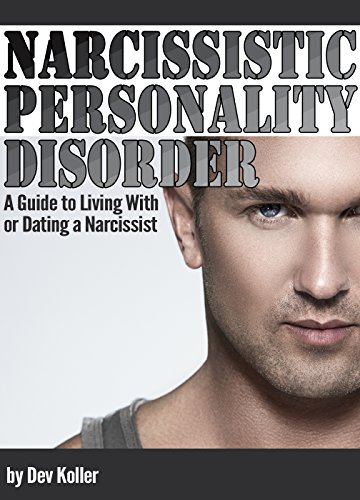 Narcissists may repeat the love bombing, but only if they feel that you have cooled off. nine0003
Narcissists may repeat the love bombing, but only if they feel that you have cooled off. nine0003
Don't expect a sincere expression of affection from narcissists - as long as you can serve their interests, you are "in the cage". As soon as they no longer need you, you can not count on attention.
Does the narcissist realize that he hurts people? Does he enjoy it?
To some extent aware that loved ones are suffering, because they tell him about it. But the priorities of the narcissist are set in a very specific way: he is the main one and will achieve his goal even to the detriment of the closest. nine0003
What are the scenarios for developing a relationship with a narcissist? Is it possible to get along with a narcissist and build a healthy relationship?
The scenario, in fact, is one, I described it above: the narcissist first binds a person to himself, then begins to manipulate.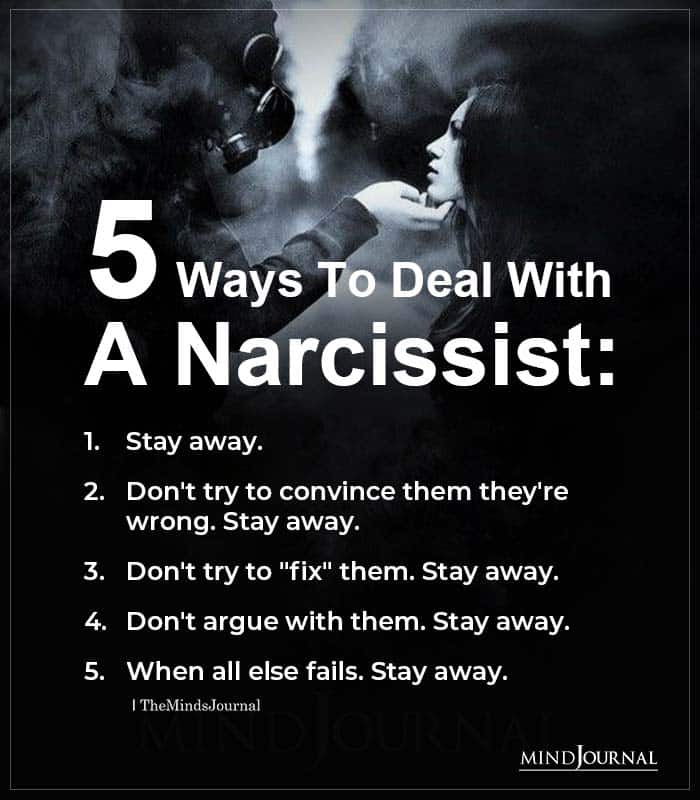 At the same time, many difficult psychological processes take place inside him, due to which he either approaches or moves away. The narcissist is not a cold-blooded manipulator, he often suffers from shame and a sense of his own worthlessness, which he tries to drown out by seeking attention to his own person. And if he does not receive what he asks, he tries to achieve this at any cost. nine0003
At the same time, many difficult psychological processes take place inside him, due to which he either approaches or moves away. The narcissist is not a cold-blooded manipulator, he often suffers from shame and a sense of his own worthlessness, which he tries to drown out by seeking attention to his own person. And if he does not receive what he asks, he tries to achieve this at any cost. nine0003
For the narcissist's partner, such relationships are always painful. To stay in this relationship or not, everyone decides for himself, and this may depend on many factors: how much narcissism is expressed in a partner, how psychologically stable you are personally, how dear this person is to you, and so on. In any case, keep in mind that these relationships are likely to be very resource intensive. Consider if you are ready for this. And remember the principle of “putting a mask on ourselves first”.
Why does the narcissist periodically return to his "victim"? Can he change? nine0183
Almost everyone can change - it all depends on the level of motivation.